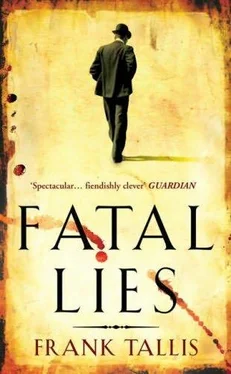Frank Tallis - Fatal Lies
Здесь есть возможность читать онлайн «Frank Tallis - Fatal Lies» весь текст электронной книги совершенно бесплатно (целиком полную версию без сокращений). В некоторых случаях можно слушать аудио, скачать через торрент в формате fb2 и присутствует краткое содержание. Жанр: Исторический детектив, на английском языке. Описание произведения, (предисловие) а так же отзывы посетителей доступны на портале библиотеки ЛибКат.
- Название:Fatal Lies
- Автор:
- Жанр:
- Год:неизвестен
- ISBN:нет данных
- Рейтинг книги:3 / 5. Голосов: 1
-
Избранное:Добавить в избранное
- Отзывы:
-
Ваша оценка:
- 60
- 1
- 2
- 3
- 4
- 5
Fatal Lies: краткое содержание, описание и аннотация
Предлагаем к чтению аннотацию, описание, краткое содержание или предисловие (зависит от того, что написал сам автор книги «Fatal Lies»). Если вы не нашли необходимую информацию о книге — напишите в комментариях, мы постараемся отыскать её.
Fatal Lies — читать онлайн бесплатно полную книгу (весь текст) целиком
Ниже представлен текст книги, разбитый по страницам. Система сохранения места последней прочитанной страницы, позволяет с удобством читать онлайн бесплатно книгу «Fatal Lies», без необходимости каждый раз заново искать на чём Вы остановились. Поставьте закладку, и сможете в любой момент перейти на страницу, на которой закончили чтение.
Интервал:
Закладка:
Damn! Damn! Damn!
Wolf sprinted to the end of the corridor and, skillfully negotiating a sharp corner, pressed his back against the wall. He held his breath and listened. He could hear a man's voice (speaking very quietly) and then a woman's voice.
Nurse Funke?
He had no intention of waiting there long enough to find out. He hurried off.
On one side of the corridor were windows overlooking a courtyard, and on the other side was a row of empty classrooms. At the end of the corridor was a wooden staircase that rose in a series of right angles and small landings. A further staircase ascended to a locked iron door.
Wolf paused-and listened.
Apart from the sound of tiny claws behind the baseboard, there was silence.
The upper level of the school had-over a period of many years-been subject to a series of eccentric modifications and revisions. Thus, the partitioning of spaces around the attic had led to the creation of many architectural anomalies: redundant corners, blind alleys, pointless niches, and steps that led nowhere at all. Among these architectural anomalies was the lost room — a neglected cavity that existed between the attic and the third story of the building.
Wolf crept underneath the final staircase and, crouching down, ran his hand over the floorboards. The tips of his fingers soon found the edge of a trapdoor, which he lifted gently. He sat on the edge of the hole, dangling his legs in the cold emptiness. Then, lowering himself, he eventually found support on a crate that had been positioned there especially for the purpose. Reaching up, he grabbed the paraffin lamp and then leaped down. He landed with a hollow, dusty thud. Wolf hung up the lamp on an overhead beam and made his way to an old leather suitcase in which he (and his small circle of associates) retained a cache of recreational aids: cigarettes, matches, brandy, some games, and a modest collection of pornographic postcards.
Wolf immediately lit a cigarette and began pacing around the room. He was annoyed with Drexler. Why hadn't he come? He wasn't the same, these days. Something in his character had changed. He was becoming more contrary, obstructive, less willing to go along with things…
Wolf sucked on his cigarette and blew the smoke out through his nostrils.
He didn't really want to confront Drexler; however, if he had to, he would. Wolf slumped down on a pile of cushions, and dragged a blanket over himself. Then, reaching into the suitcase, he pulled out a volume of philosophy that Professor Gartner had given him. It was titled Beyond Good and Evil, and it contained a passage that had played on his mind. He didn't quite understand it, but he felt that repeated readings might reveal its secret-some special truth that resided just beyond the literal meaning of the printed words.
Wolf lengthened the wick of the paraffin lamp and opened the book at the correct page. He read the passage aloud: “There are no moral phenomena at all, only a moral interpretation of phenomena…”
Wolf stubbed the cigarette out on the floor.
Yes, this was true-and so, by implication, one could never really go too far.
4
Rheinhardt wondered whether he had treated the driver's remarks too flippantly. The woodman was indeed a strange one. Might such a man purposely instruct strangers to follow a dangerous road? Were they-at that very moment-blithely rolling toward some fatal precipice?
Again, he was reminded of the old stories: wolves, witches, and supernatural beings whose appearance invariably presaged death. To dispel his unease, he began humming Rosen aus iem Suien. His thoughts returned to the ball. What would the orchestra be playing now? Kunstlerlehen, perhaps-or Wein, We ft uni Gesang?
After some time had passed, the driver let out a cry. “Inspector! Inspector! This must be it!”
Rheinhardt opened the window. They were passing between two cast-iron gates set in a crumbling high wall. The fog was less thick, and in the distance, across a flat expanse of land, he could see illuminated windows. Rheinhardt sighed with relief.
The carriage rattled down a long drive and finally stopped. The inspector and his assistant jumped out and took stock of their surroundings. They were standing next to a weather-beaten statue, the features of which had been worn smooth; however, it was still possible to identify a bearded warrior holding a lance, with one foot raised on what appeared to be a tub.
“Saint Florian,” said Rheinhardt.
“He looks more like a Roman soldier,” said Haussmann.
“Well, that's because he was a Roman soldier-a military administrator, posted here, in Austria. But that, alas, is the limit of my knowledge.”
Rheinhardt faced the school.
The building was Gothic in design, possessing three rows of triple lancet windows and four octahedral spires. A cloistered courtyard could be seen through a central stone arch. Rheinhardt and Haussmann entered the courtyard, and as they did so, a door opened through which an elderly man appeared. He was clearly a servant, but he wore a military decoration on his jacket.
“Gentlemen!” the old man cried.
Rheinhardt and Haussmann stepped forward, but as they did, the veteran's expression changed from eagerness to disappointment.
“Oh dear-very sorry-I mistook you for someone else.”
“I beg your pardon?” asked Rheinhardt.
“The headmaster is expecting two gentlemen from the security office.”
“Indeed. I am Inspector Rheinhardt and this is my assistant, Haussmann.” The old man narrowed his eyes. “Yes,” Rheinhardt continued, recognizing that their appearance might require an explanation. “We are somewhat overdressed, but it was our misfortune to be called here directly from a ball.”
“Ball, you say?”
“Yes,” said Rheinhardt, adding emphatically, “The detectives’ ball.”
The old soldier mumbled something to himself and then, pulling himself up, said: “Humbly report-this way, please.”
He guided them to a door beneath the cloisters, and they entered a long, shadowy corridor. At its end, in a pool of blue light cast by suspended paraffin lamps, stood two men in academic gowns.
“Headmaster,” the old man called out. “They're here, sir. The gentlemen from the security office. Inspector Rheinhardt and his assistant.”
“Thank you, Albert,” said one of the men. “Dismissed.”
The old soldier stamped his feet, saluted, and shuffled away. Catching Rheinhardt's eye, the headmaster whispered. “A good fellowsaw action in ‘48. The Budapest siege.”
The headmaster was a man in his late fifties, with gray, almost white, hair. A snowy thatch had been raked over his head to conceal a thinning crown. Although his cheeks were ruddy and plump, he possessed an alert, severe face, with high, arched eyebrows. A small triangle of hair curled outward from his chin. He executed a perfunctory bow. “Professor Julius Eichmann, school superintendent.” He gestured toward his companion. “And my deputy, Dr. Bernhard Becker.”
The deputy headmaster inclined his head.
“Thank you for coming, Inspector,” Eichmann continued. “And from a social engagement, it seems.” He scrutinized the policeman from head to toe, his expression souring slightly at the sight of Rheinhardt's muddy shoes and splashed trousers.
“An accident,” said Rheinhardt.
The headmaster nodded sharply and said: “Well, Inspector, this is a most unusual circumstance. We are entirely in your hands. How do you wish to proceed?”
“I would like to see the…” He hesitated before choosing to say “boy” instead of “body.”
“Very well. We will take you to the infirmary.”
Rheinhardt frowned. “What? He's been moved?”
“Yes,” said the headmaster.
Читать дальшеИнтервал:
Закладка:
Похожие книги на «Fatal Lies»
Представляем Вашему вниманию похожие книги на «Fatal Lies» списком для выбора. Мы отобрали схожую по названию и смыслу литературу в надежде предоставить читателям больше вариантов отыскать новые, интересные, ещё непрочитанные произведения.
Обсуждение, отзывы о книге «Fatal Lies» и просто собственные мнения читателей. Оставьте ваши комментарии, напишите, что Вы думаете о произведении, его смысле или главных героях. Укажите что конкретно понравилось, а что нет, и почему Вы так считаете.












